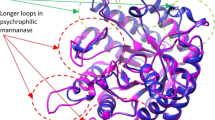Abstract.
Organisms living in permanently cold environments, which actually represent the greatest proportion of our planet, display at low temperatures metabolic fluxes comparable to those exhibited by mesophilic organisms at moderate temperatures. They produce cold-evolved enzymes partially able to cope with the reduction in chemical reaction rates and the increased viscosity of the medium induced by low temperatures. In most cases, the adaptation is achieved through a reduction in the activation energy, leading to a high catalytic efficiency, which possibly originates from an increased flexibility of either a selected area of or the overall protein structure. This enhanced plasticity seems in return to be responsible for the weak thermal stability of cold enzymes. These particular properties render cold enzymes particularly useful in investigating the possible relationships existing between stability, flexibility, and specific activity and make them potentially unrivaled for numerous biotechnological tasks. In most cases, however, the adaptation appears to be far from being fully achieved.
Similar content being viewed by others
Author information
Authors and Affiliations
Additional information
Electronic Publication
Rights and permissions
About this article
Cite this article
Zecchinon, L., Claverie, P., Collins, T. et al. Did psychrophilic enzymes really win the challenge?. Extremophiles 5, 313–321 (2001). https://doi.org/10.1007/s007920100207
Received:
Accepted:
Issue Date:
DOI: https://doi.org/10.1007/s007920100207




